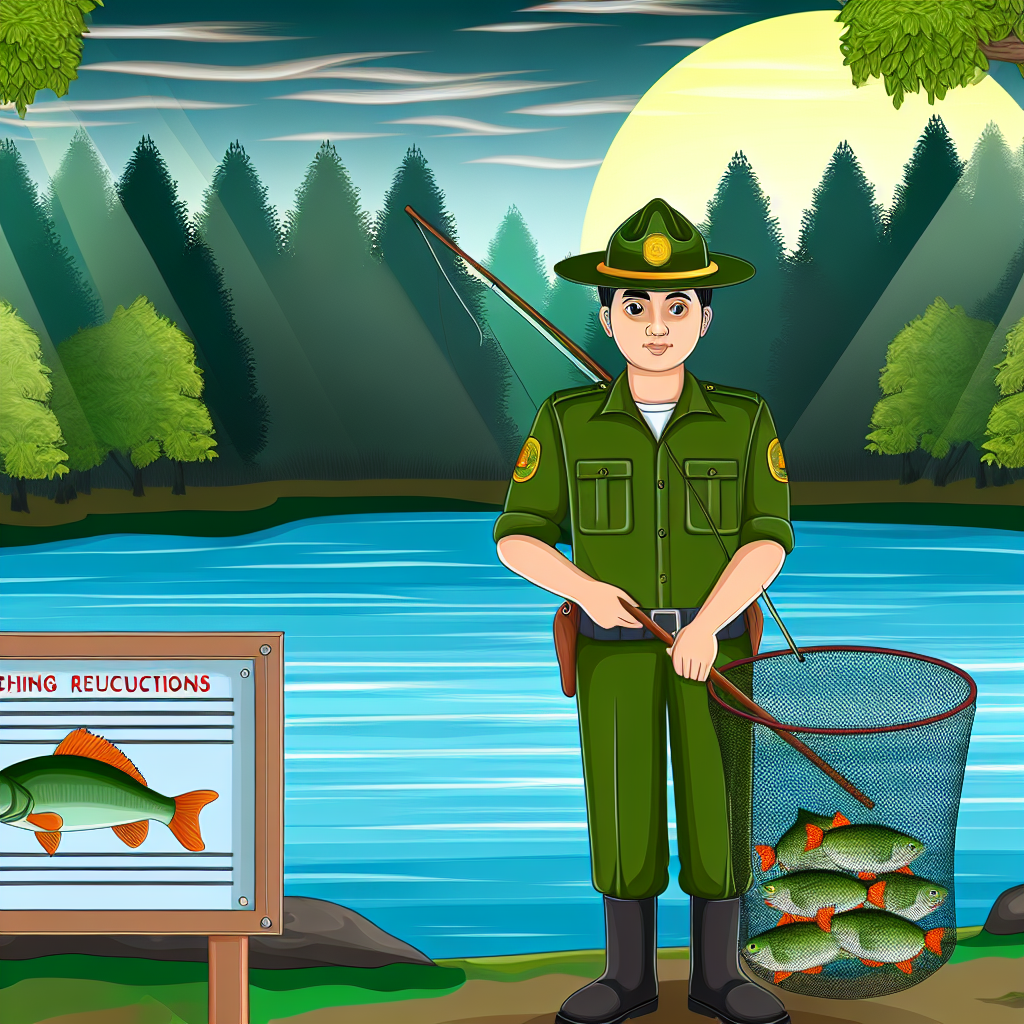Introduction
Fish and Game Wardens enforce laws related to hunting and fishing.
Park Rangers oversee and protect wildlife and natural resources in parks.
Wildlife conservation and land management are crucial for preserving ecosystems.
Responsibilities of Fish and Game Wardens
Fish and Game Wardens have a diverse set of responsibilities that revolve around protecting wildlife, enforcing regulations, and preserving natural habitats.
Let’s take a closer look at the key duties of these professionals.
Enforcing Fishing and Hunting Regulations
One of the primary responsibilities of Fish and Game Wardens is to enforce fishing and hunting regulations.
They ensure that individuals comply with laws related to the harvest of fish and game animals.
This involves patrolling waterways, forests, and other natural areas to monitor activities and enforce rules.
Investigating Wildlife Crimes
Fish and Game Wardens also play a crucial role in investigating wildlife crimes.
This includes illegal hunting, fishing, poaching, and other activities that threaten the well-being of wildlife populations.
Wardens work to gather evidence, conduct interviews, and collaborate with law enforcement agencies to prosecute offenders.
Monitoring and Protecting Wildlife Habitats
In addition to enforcing regulations and investigating crimes, Fish and Game Wardens are responsible for monitoring and protecting wildlife habitats.
They conduct surveys, collect data, and assess the health of ecosystems to ensure the long-term viability of wildlife populations.
Wardens also work to mitigate threats such as pollution, habitat destruction, and invasive species that can negatively impact natural habitats.
Fish and Game Wardens play a critical role in conservation efforts and wildlife management.
Their dedication to enforcing regulations, investigating crimes, and preserving habitats helps to protect and sustain the diverse array of plant and animal species that call natural environments home.
By upholding laws and promoting sustainable practices, Fish and Game Wardens contribute to the health and vitality of ecosystems for future generations to enjoy.
Qualifications and Training for Fish and Game Wardens
Fish and Game Wardens play a crucial role in conservation efforts and wildlife protection.
To become a Fish and Game Warden, individuals must meet specific qualifications and undergo rigorous training.
Required Education and Experience
The following education and experience are generally required:
Transform Your Career Today
Unlock a personalized career strategy that drives real results. Get tailored advice and a roadmap designed just for you.
Start Now- Minimum of a high school diploma or GED
- Bachelor’s degree in natural sciences, criminal justice, or related field preferred
- Experience in law enforcement or wildlife management
Specific Skills and Certifications Needed
Fish and Game Wardens must possess the following skills:
- Strong communication and interpersonal skills
- Knowledge of wildlife laws and regulations
- Ability to operate firearms and other law enforcement equipment
- First aid and CPR certification
Physical Fitness Requirements
Physical fitness requirements for Fish and Game Wardens include:
- Ability to pass a physical fitness test
- Demonstrated strength and agility for outdoor activities
- Physical endurance for long hours of surveillance and patrols
Fish and Game Wardens must possess a combination of education, experience, skills, and physical fitness.
These qualifications allow them to protect wildlife and enforce conservation laws effectively.
Delve into the Subject: Legal Authority of Campus Security Officers
Park Rangers
Park Rangers play a crucial role in the conservation and preservation of natural resources in state and national parks.
Their daily tasks include:
-
Maintaining park facilities, including trails, campgrounds, and visitor centers.
-
Providing information and assistance to park visitors, including directions, safety tips, and park rules.
-
Leading educational programs and tours to educate visitors about the park’s natural and cultural resources.
Park Rangers are often the face of the park.
Their main duties involve ensuring that visitors have a safe and enjoyable experience.
They also protect the park’s ecosystems.
Fish and Game Wardens
Fish and Game Wardens focus on enforcing laws and regulations related to hunting, fishing, and wildlife protection.
Their daily tasks include:
-
Patrolling designated areas to enforce hunting and fishing laws, protect wildlife, and prevent illegal activities.
-
Investigating reports of poaching, illegal fishing, and other wildlife-related crimes.
-
Conducting inspections of hunting and fishing licenses to ensure compliance with regulations.
Fish and Game Wardens play a critical role in preserving and managing natural resources.
They enforce laws that protect wildlife and their habitats.
Key Differences
While both Park Rangers and Fish and Game Wardens are dedicated to the conservation of natural resources, there are key differences in their daily tasks and areas of focus.
Park Rangers are more focused on recreational activities and visitor services.
In contrast, Fish and Game Wardens concentrate on law enforcement and wildlife protection.
Both roles are essential in maintaining the balance between conservation and recreation in our natural areas.
Delve into the Subject: Top Security Consulting Firms in the USA
Qualifications and Training for Park Rangers
When it comes to qualifications and training for Park Rangers, there are several key aspects to consider.
Transform Your Career Today
Unlock a personalized career strategy that drives real results. Get tailored advice and a roadmap designed just for you.
Start NowFrom education and work experience requirements to knowledge of environmental science and conservation, Park Rangers must possess a diverse set of skills and expertise to excel in their roles.
Education and Work Experience Requirements
Park Rangers typically have a bachelor’s degree in fields such as environmental science, biology, ecology, or a related discipline.
Some employers may also require additional certifications or specialized training in areas such as wildlife management or natural resource conservation.
In terms of work experience, Park Rangers often start out in entry-level positions and work their way up through the ranks by gaining practical experience in the field.
Knowledge of Environmental Science and Conservation
One of the most important qualifications for Park Rangers is a deep understanding of environmental science and conservation principles.
This includes knowledge of ecosystems, wildlife habitats, endangered species, and the impact of human activities on the natural environment.
Park Rangers must be able to apply this knowledge to their day-to-day work, such as protecting and preserving park lands, enforcing regulations, and educating visitors about conservation efforts.
Customer Service and Communication Skills
In addition to their technical expertise, Park Rangers must also possess strong customer service and communication skills.
They interact with a wide range of visitors, from families and school groups to hikers and campers, and must be able to effectively communicate with diverse audiences.
This includes providing information about park facilities, activities, and regulations, as well as resolving conflicts and addressing safety concerns.
Park Rangers also play a crucial role in educating the public about the importance of conservation and sustainability.
The qualifications and training required for Park Rangers reflect the diverse and demanding nature of their role.
By combining scientific knowledge, practical skills, and interpersonal abilities, Park Rangers are able to effectively manage and protect natural resources while providing a positive and educational experience for park visitors.
Uncover the Details: Emergency Response: Role of Bomb Squad Technicians

Work Environment of Fish and Game Wardens
Fish and Game Wardens have a unique and challenging work environment that involves patrolling remote areas and water bodies.
- Patrolling Remote Areas and Water Bodies: Fish and Game Wardens often spend their days in isolated locations, away from civilization. They may need to navigate through dense forests, rugged terrain, and bodies of water to enforce wildlife protection laws.
- Working in All Types of Weather Conditions: Regardless of the weather, Fish and Game Wardens are required to be on duty. They may have to endure extreme temperatures, heavy rainfall, or blizzard conditions while performing their duties.
- Potential Dangers and Risks: The job of a Fish and Game Warden comes with inherent risks and dangers. They may encounter wild animals, armed poachers, or even hazardous materials while carrying out their law enforcement duties.
Despite these challenges, Fish and Game Wardens are dedicated to protecting wildlife and enforcing conservation laws in their assigned areas.
Learn More: The Role of Campus Security in Crisis Management
Work Environment of Park Rangers
Park rangers have a dynamic work environment that involves a combination of administrative tasks and outdoor work.
- Interacting with diverse groups of people: Park rangers often engage with visitors from various backgrounds and cultures.
- Maintaining parks and trails: They are responsible for keeping the natural areas clean and preserving the environment.
- Leading educational programs: Park rangers educate the public about conservation and wildlife in the parks.
- Enforcing park regulations: They monitor park activities to ensure compliance with rules and regulations.
Challenges Faced by Park Rangers
While working in the great outdoors may sound idyllic, park rangers also face several challenges in their daily responsibilities.
- Weather conditions: Park rangers must work in all types of weather, from scorching heat to freezing cold.
- Wildlife encounters: Dealing with wildlife, including potentially dangerous animals, is a regular part of the job.
- Search and rescue missions: Park rangers are often involved in locating and rescuing lost or injured hikers.
- Emergency response: They must be prepared to handle emergencies such as fires or medical situations.
Skills Required for Park Rangers
To excel in their roles, park rangers need to possess a diverse set of skills that enable them to navigate the complexities of their job.
Transform Your Career Today
Unlock a personalized career strategy that drives real results. Get tailored advice and a roadmap designed just for you.
Start Now- Interpersonal skills: The ability to communicate effectively with a wide range of people is crucial.
- Physical fitness: Park rangers must be in good physical condition to handle the demands of the job.
- Attention to detail: Being observant and detail-oriented is essential for maintaining park safety.
- Problem-solving skills: Park rangers must be quick thinkers who can adapt to unexpected situations.
Advantages of Being a Park Ranger
Despite the challenges, being a park ranger comes with numerous advantages that make it a rewarding career choice.
- Connection to nature: Park rangers have the opportunity to work in beautiful natural settings.
- Job satisfaction: Making a positive impact on the environment and community can be fulfilling.
- Varied tasks: Park rangers enjoy a diverse range of responsibilities that keep the job interesting.
- Career growth: There are opportunities for advancement and specialization within the field of park management.
After examining the roles of Fish and Game Wardens and Park Rangers, it is evident that both play a crucial part in protecting our natural resources.
Importance of Fish and Game Wardens
Fish and Game Wardens are responsible for enforcing laws related to hunting, fishing, and wildlife protection, ensuring that populations are sustainable.
They also play a vital role in preventing poaching and illegal activities that can harm wildlife populations and their habitats.
With their specialized training and expertise, Fish and Game Wardens are on the front lines of conservation efforts, safeguarding ecosystems and biodiversity.
Role of Park Rangers
Park Rangers focus on managing and preserving national parks, ensuring that visitors can enjoy these natural wonders responsibly.
They provide education to the public, lead guided tours, and oversee recreation activities to minimize impact on the environment.
Park Rangers also work to protect endangered species and maintain the ecological balance within the park, promoting sustainability and conservation.
Impacts of Conservation Roles
Both Fish and Game Wardens and Park Rangers play vital roles in protecting our natural resources and promoting conservation efforts.
Individuals interested in wildlife conservation and land management should consider career opportunities in these fields to make a difference.




